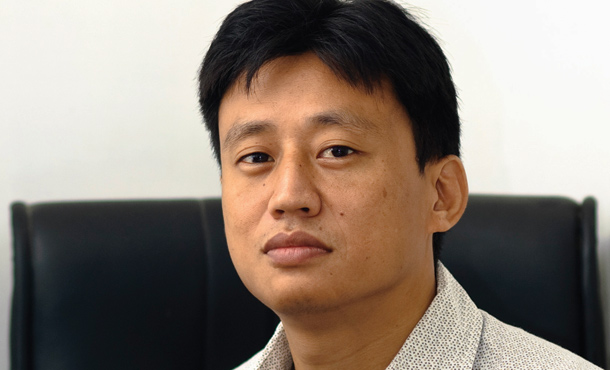Aküm Longchari, MA ’00
Dimapur, Nagaland
(far northeastern India on maps)
 To have any understanding of Aküm Longchari’s work, one must have some knowledge of his people, the indigenous Nagas, of his homeland, Nagaland.
To have any understanding of Aküm Longchari’s work, one must have some knowledge of his people, the indigenous Nagas, of his homeland, Nagaland.
Nagaland is located between Burma, China and Bangladesh. For political and safety reasons, tourist visas are difficult to come by. Blogging on www.world66.com, one visitor wrote: “Nature could not have been kinder to Nagaland, the exquisitely picturesque landscape, the vibrantly colorful sunrise and sunset, lush and verdant flora, this is a land that represents unimaginable beauty, molded perfectly for a breathtaking experience.” The blogger spoke of Nagaland containing 35 major tribes and subtribes, each with “its own customs, language and dress.” Each tribe can be “easily distinguished by the colorful and intricately designed costumes, jewelry and beads that they wear.”
Let us clarify here that Aküm Longchari is not a mountaintop-dwelling tribesman easily distinguished by his “costumes and beads.” Wearing factory-made clothing like most urbanites, Aküm has regularly attended, and led, peace-themed and human rights workshops in India and around the world.
In addition to his MA in conflict transformation from EMU, he holds a law degree from a university in New Delhi. He has been a scholar at the Caux Institute in Switzerland and a fellow with the Salzburg Seminar. He is a PhD candidate at the University of New England in Australia, where his research focuses on the right to self-determination as a resource for peace.
Parts of Aküm’s homeland fell under British administration in the 1800s. During this period, Christian missionaries assiduously converted the majority of Nagas. Today more than 90% of Nagas are practicing Christians, predominantly Baptists with some Catholics and other denominations. The official language of education and inter-country communication is English.
Thus, in addition to its distant location from subcontinental India, Nagaland is set apart from India by: the prevalence of Christianity, rather than Hinduism; the dominant use of the English language, rather than Hindi; and the Nagas’ status as indigenous people who look and act differently from Indians.
The entire northeast region has been embroiled in violent conflict at various points since the early 1900s. In 1997, a bilateral ceasefire agreement was signed with India’s central government to enable political negotiations to take place. Open warfare has subsided, but fundamental issues remain unresolved.
Aküm paints this picture of the current situation: Nagaland has experienced human rights violations and heavy militarization, which has caused the social networks to collapse, especially during the past 60 years. This has displaced people from their land and created further divisions among the indigenous groups. There has been considerable bloodshed along tribal and political lines among the Nagas. The Indian government does not address the problems that fuel the violence, including: the government’s oppressive conduct; high unemployment; poor health care; and a weak infrastructure.
Where does Aküm personally fit into this picture? Aküm is known in his homeland for his emphasis on all parties taking responsibility for past harms, listening to each other’s truths, and working toward reconciliation in the interests of the well-being of all. He does not demonize the Indian government, but he does ask it to be “accountable,” so that a political solution can be found to the Naga struggle for self-determination.
Aküm says he has been dedicated to nonviolent approaches to addressing wrongs and injustices since an early age. He was formerly with the Naga People’s Movement for Human Rights, which initiated people-to-people dialoguing and the “Journey of Conscience” – a nonviolent campaign for peace by Naga civil society groups.
One of the ways Aküm manifests his philosophy is through the English-language newspaper he co-founded in 2005, The Morung Express. It has, he says, a “justpeace” approach to journalism. In September 2010, Aküm was honored for his peace work at the North East [India] Regional Youth Peace Festival.
In 2008, Aküm and other representatives of civil society organizations formed the Naga Forum for Reconciliation, with support from members of the Society of Friends (Quakers) in Britain and members of the American Baptist Church. The forum seeks to reconcile various Naga armed groups on the basis of the historical and political rights of the Nagas. The forum has been meeting with militant groups for nearly two years. According to one participant, the groups have moved from “violence, uncertainty, mistrust and fear” to a situation of “fragile and yet substantive progress, with decreased violence.” General meetings are held in a third country and symbolic events, such as soccer matches involving teams of players from different groups, have been instrumental for paving the way toward reconciliation.
